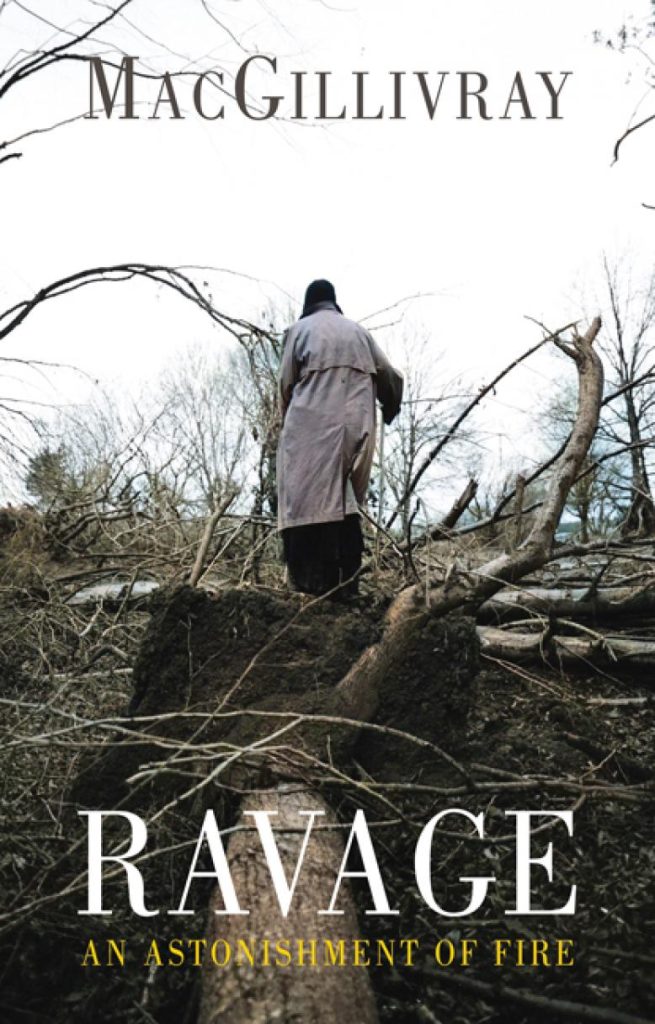Ravage: An Astonishment of Fire
MacGillivray
Bloodaxe (2023)
Pbk:£14.99
my real marks…I hide beneath my overcoat, trace
the seams of its rough-sewn darts: skins shield, sweats salt, but
anatomies of sorrow, only death reveals.
(Celestial Metre: Wounded Centaur Hexameter)
In July 2022, MacGillivray (‘matrilineal Highland pen-name of writer, artist and musician Kirsten Norrie’) interred family ashes in the clan enclave on the Hebridean Eilean a’ Bhàis. During this mourning journey, she uncovered a mystery in ‘the contents of two long-disused rooms in the lighthouse tower’. These included wide-ranging papers, objects once-belonging to the Norwegian-Shetlandic poet Kristján Norge, and some related materials left by his companion, Luce Moncreiff. The lighthouse was abandoned in 1961, following Norge’s still-unexplained disappearance. Prior to her own departure from the island, Moncreiff ‘compiled, catalogued, annotated and typed the bulk of his scattered body of work’. ‘Scattered’ is apt, as work was buried at locations marked on hand-drawn maps and written into walls.
astonished fire, still cold, still distant (Kristján Norge)
Were I to fully document the book’s sources, even as a tabulated bibliography, I’d soon exhaust my word-count, without being nearly definitive. Ravage is complex, cryptic and multi-layered; what I offer is a pointer to some of its seams, and a possible portal to reading.
MacGillivray’s response to this remarkable source material is astonishing in its thoroughness and creativity.Ravage visits realms of Gaelic folklore, language and custom, all of which drew Norgay from Edinburgh’s Old Town to this remote, death-connected island. You will find alchemical palingenisis, astronomy, navigation aids, diagrams to be read in tune with mathematical theory as a means of building new forms of poetic metre. There are re-imagined Tarot decks, reconsiderations of Dante and Milton, and classical mnemonics. MacGillivray captures Norgay’s ‘fractured authorship’, his working practices, beliefs and the process of his terrifying mental disintegration… ‘crossings-out, slashings and underlinings, bracketed alternatives and lines made bold’. Throw in pyrographic writings, a reflection cast in shape-changing mirrors and a poet who believed, pursued by Sluagh that he had turned demon, and we are challenged. There is far more.
Rather than reduce this to a catalogue of terms, I’d ask the reader to try not to be overly-analytical initially, when faced by this daunting breadth, depth and complexity. Few are versed in all these underpinnings (I certainly wasn’t) but we are accustomed to be forensic in our reading; releasing ourselves from that doesn’t come naturally. Especially when reviewing.
I had the privilege of hearing MacGillivray read from Ravage in November 2023. Her voicing was mesmerising, incantatory. which lead me into my own reading. That is not to say I didn’t rise from the text, happening upon embedded embers of text, nuggetted typographically in prose poetry. Also, who could overlook the joy of coinages like ‘winter-lithic’? However wrapped in the fires, demons and strands I was, there were strong moments of…yes, Gaelic is being referenced here, but there are underlying aspects of Norse kennings, surely? Are there not almost anti-kennings (my term) where words split, not as we know them, but perhaps as we do not yet, as in ‘con-tempt’. All of this is carried by an ecstatic and arguably vatic flow. In the flexing of ‘madrigal/ miracle’, the reader will hear echoes of the unstated ‘magical’, just as the proximity of ‘sear/seer’ may also evoke ‘smear’. So, I am not advocating carelessness, but if possible, let your initial reading be ‘ethereal, wind-blown’ allowing the strangeness of the syntax and the ‘articulate smoke’ of those Reflexion Flashes’ to work before you dissect ‘The star-ravaged co(r)pse)’.
Ravage meditates on a lost poet’s work. I sense that a grail of Norge’s complex creativity was gathered by Moncreiff; MaGillivray in turn carries it in this extraordinary vessel, as his co-choisiche (spirit co-walker). Her research can be accessed, with prior consent, in the Scottish Poetry Library.
Perhaps our place, in turn, is to allow ourselves astonishment. The forensic re-readings will follow, as questions rise from the saline ash.
Beth McDonough


Intriguing. Overwhelmingly interesting. The quote that attracts me: “astonished fire, still cold, still distant” – (Kristján Norge)….. and the compelling title, made me curious to purchase MacGillivray’s book RAVAGE. Finding a wealth of layers of meaning and a language of exceptional quality and excellence, reading about something newly discovered and designed into a book, a means that is accessible to us all …. is most exciting and makes me feel like a successful gold-digger.